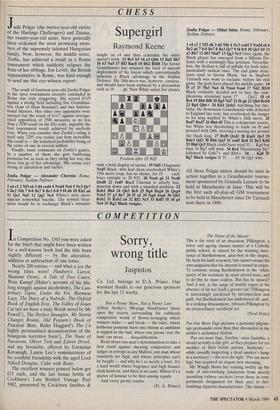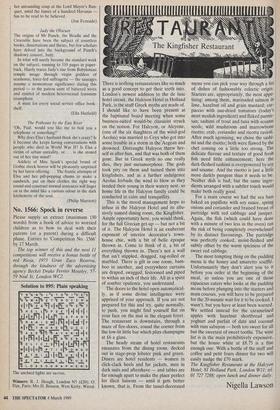COMPETITION
Sorry, wrong title
Jaspistos
In Competition No. 1563 you were asked for the blurb that might have been written for a well-known hook had the title been slightly different — by the alteration, addition or subtraction of one letter.
Nearly 200 entries — and what a joy the wrong titles were! Flaubert's Carrot, Madame Ovary, A Tale of Two Cuties; Weir' Kampf (Hitler's account of his life- long struggle against alcoholism), The Can- terbury Tapes, Under the Vet, Burmese Lays, The Dairy of a Nobody, The Oxford Book of English Erse, The Valley of Jones ('at last we have a truly Welsh novel by Mr Powell'), The Perfect Strangler, Mr Norris Changes Brains, Old Possum's Book of Practical Mats, Rider Haggard's The ('a highly personalised deconstruction of the bourgeois narrative form'), The Nuns of Navarone, Oliver Twit and Edwin Drool, and my favourite, offered by Cornelius Kavanagh, Laurie Lee's reminiscences of his youthful friendship with the aged Lord Alfred Douglas, Cider with Bosie.
The excellent winners printed below get £15 each, and the last bonus bottle of Cockburn's Late Bottled Vintage Port 1982, presented by Cockburn Smithes & Co. Ltd, belongs to D.A. Prince. Our warmest thanks to our generous sponsors for the last 12 weeks.
Not a Peony More, Not a Peony Less Jeffrey Archer's 500-page blockbuster blasts open the secrets surrounding the ruthlessly competitive world of flower-arranging where winners make — and break — the rules, where hothouse passions burst into bloom as ambition is nipped in the bud, where one peony over the limit can mean. . . disqualification.
Read about one man's determination to take a firm stand against cheating competitors and judges as corrupt as any Mafiosi; one man whose standards are high, and whose principles can't be bought — and why he's so nearly a loser. It's a hard world where fragrance and high finance clash head-on, and there is no oasis. Where it's a matter of honout to be first among equals.
And every peony counts. (D. A. Prince) The Heart of the Master This is the story of an obsession. Pilkington, a bitter and ageing classics master at a Catholic public school, is stirred by the winning inno- cence of Bartholomew, altar-boy in the chapel. He feels his faith renewed, but cannot escape his own suspicion that his interest is sexual in origin. To continue seeing Bartholomew in the 'white purity of his vestment' he must attend mass, and to do' this he must confess. But has he sinned? And if not, is the surge of wistful regret at his absence of sin not itself a greater sin? Pilkington is increasingly' paralysed by introspection and guilt, but Bartholomew has understood all, and, in a striking denouement, releases Pilkington by an extraordinary sacrificial act.
(Noel Petty)
Put Out More Fags pictures a personal pilgrim- age profounder even than that chronicled in the author's acclaimed Helena.
'Put out more fags, Jocelyn,' cries Jacintha, a steady seventy-a-day girl, as they prepare for yet another of their brittle parties. Suddenly while casually inspecting a dead smoker's lungs in a mortuary — she sees the light. 'Put out more fags' has acquired an urgent new meaning.
Mr Waugh shows her soaring swiftly up the scale of anti-smoking fanaticism from merely assaulting railway smokers (even those in com- partments designated for their use) to fire- bombing cigarette manufactories. The climax — her astounding coup at the Lord Mayor's Ban- quet, amid the fumes of a hundred Havanas has to be read to be believed.
(Jon Fernside) Judy the Obscure The origins of Mr Punch, the Beadle and the Crocodile have been the subject of countless books, dissertations and theses, but few scholars have delved into the background of Punch's shadowy consort, Judy.
In what will surely become the standard work on the subject, running to 510 pages in paper- back, Hardy traces Judy's rise from Babylonian temple image through virgin goddess of seashores, force-fed suffragette — the sausages assume a momentous significance during this period — to the patron saint of battered wives and symbol of modern heterosexual feminism triumphant.
A must for every social service office book- shelf.
(Ella Hatfield)
The Pothouse by the East River
'Oh, Paul, would you like me to boil you a telephone or something?'
Why does Elsa's husband think she's crazy? Is it because she keeps having conversations with people who died in World War 1I? Is Elsa a victim of urban unreality, or. . . is she stoned out of her tiny mind?
Addicts of Miss Spark's special brand of Gothic shock-horror will be pleasantly surprised by her latest offering. . . The frantic attempts of Elsa and her pill-popping chums to make a sandwich, put on their clothes the right way round and construct normal sentences will linger on in the mind like a curious odour in the dark kitchenette of the soul.
(Philip Marriott)

















































 Previous page
Previous page